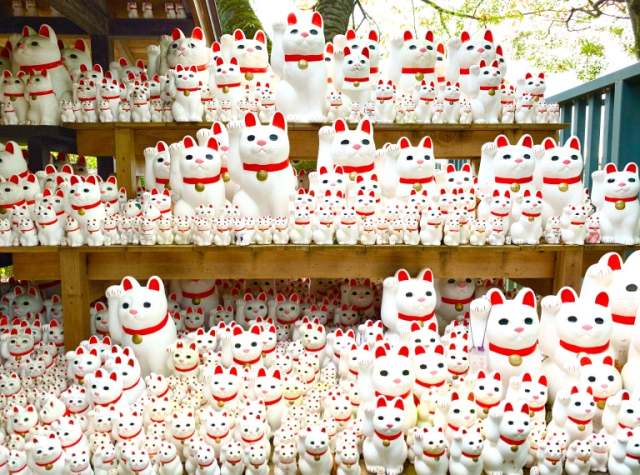
Like the samurai lord who visited 400 years ago, we get beckoned to this suburban temple by its feline charm.
There are several reasons to visit Tokyo’s Gotokuji Temple. Located in residential Setagaya Ward, it’s far enough off the beaten tourist track that it’s not nearly as likely to be crowded with visitors, like some of Tokyo’s more famous temples. It’s also got a lovely, if compact, garden courtyard and even a three-story pagoda.
But really, the biggest, and also most numerous, reasons to stop by Gotokuji Temple are the hundreds, if not thousands, of traditional cat figurines on display.
These cute little guys are called maneki neko, which translates to “beckoning cats.” With a single paw raised up in the Japanese gesture for “come here,” they’re said to draw good fortune into homes and places of business, and you’ll often spot them in or near the entrance of houses, shops, and restaurants in Japan.
But there’s more to Gotokuji’s astounding maneki neko population than just Japan’s steady love affair with cute animals and good-luck charms. There’s history as well. Roughly 400 years ago, Ii Naotaka, the samurai lord of Omi Province (present-day Shiga Prefecture), was passing through the vicinity of Gotokuji as the skies darkened and a thunderstorm approached. It was then that he crossed paths with a cat that lived at the temple with its monks, which beckoned to the samurai. Following it, Naotaka arrived at Gotokuji, where he took shelter from the rain and lightning.
In gratitude, Naotaka became the Gotokuji’s patron, and since the temple had truly benefited from a cat beckoning good fortune, it’s now become a popular local pilgrimage site for cat lovers as well.
As to where all the figurines come from, the temple itself sells them to visitors. The most compact and inexpensive stands about two centimeters (0.8 inches) tall and costs just 300 yen (US$2.80), while the largest is 30 centimeters and 5,000 yen.
While it’s not the typical way for maneki neko to be used, many visitors to Gotokuji write a wish and their name on the figurine, sort of like what’s done with wooden ema prayer boards at shrines and temples in Japan. After writing their desire, many visitors then add their kitty to the rest on Gotokuji’s shofuku neko honosho (beckoning cat offering shelves), but when space gets tight, sometimes the figurines end up in other spots as well.
When we asked the temple staff what the exact procedure is for offering a cat figurine, they told us that there really aren’t any set rules. For example, some people purchase a figurine, leave it at the temple, and then come pick it up once their wish has been granted. However, you’re also welcome to take your figurine home with you on the day you purchase it, and the temple actually wishes a few more people would do this, since there’s only so much space to display them all.
As we walked around the grounds, it began to feel like each cat had its own expression, much like how they’re each carrying a different person’s wishes.
And while cats are by no means hard to find here, if you search carefully enough, you might discover a hidden feline, since the carved wooden cat on Gotokuji’s pagoda takes the place of the mouse in the traditional Chinese zodiac animal set.
If you’ve grown up accustomed to Western gestures, the raised paws of the maneki neko might look more like it’s saying good-bye, but even that made for a warm fuzzy feeling as we headed back home…
…and since we brought back two luck-beckoning cats of our own, we’ve got a hunch good things are waiting for us in the future.
Temple information
Gotokuji Temple / 豪徳寺
Address: Tokyo-to, Setagaya-ku, Gotokuji 2-24-7
東京都世田谷区豪徳寺2丁目24−7
Photos ©SoraNews24
● Want to hear about SoraNews24’s latest articles as soon as they’re published? Follow us on Facebook and Twitter!
[ Read in Japanese ]


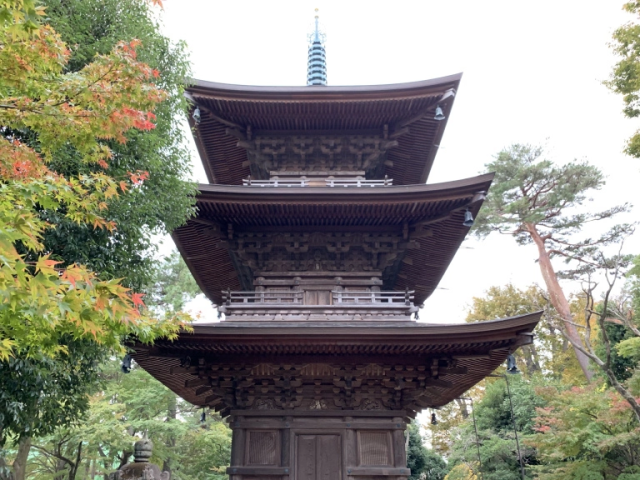
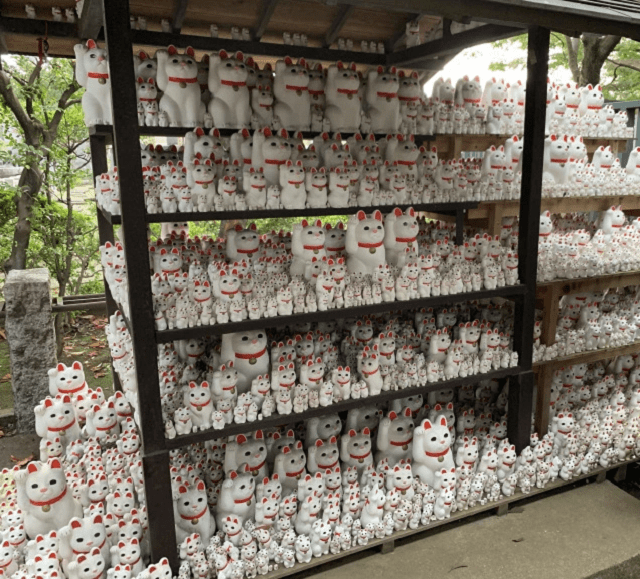
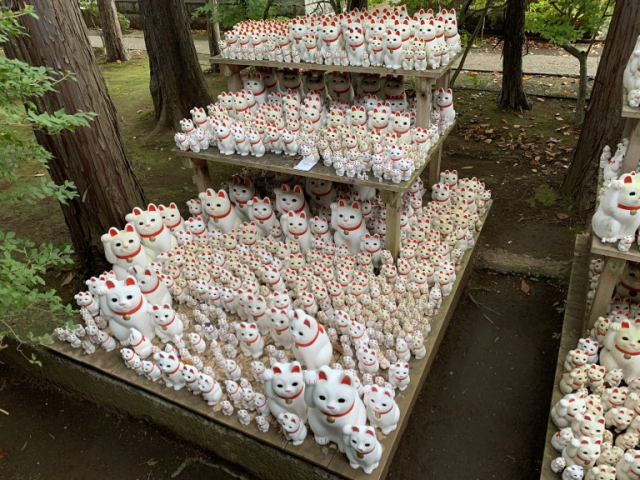
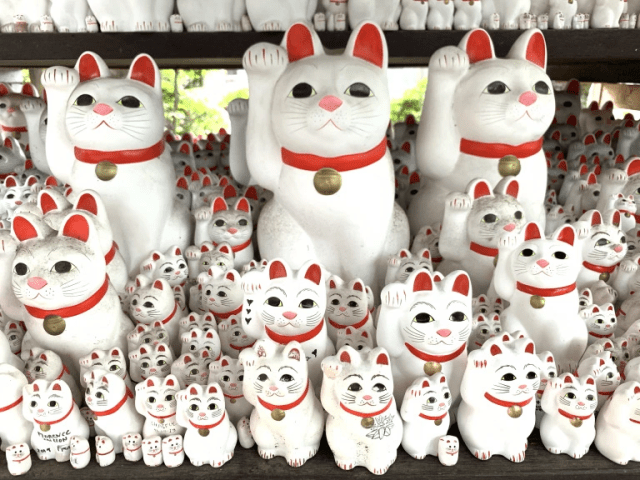
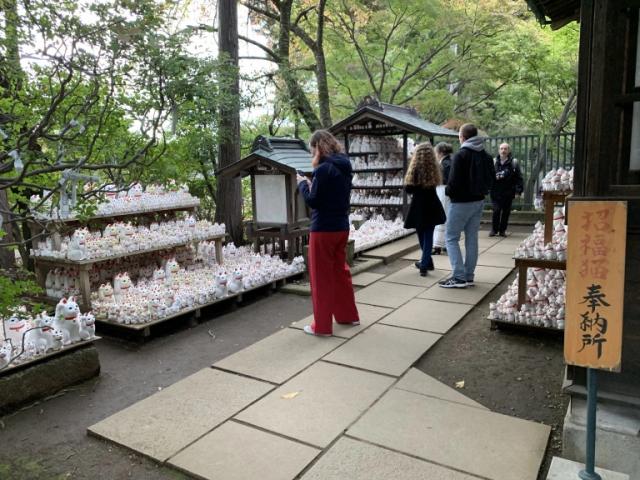
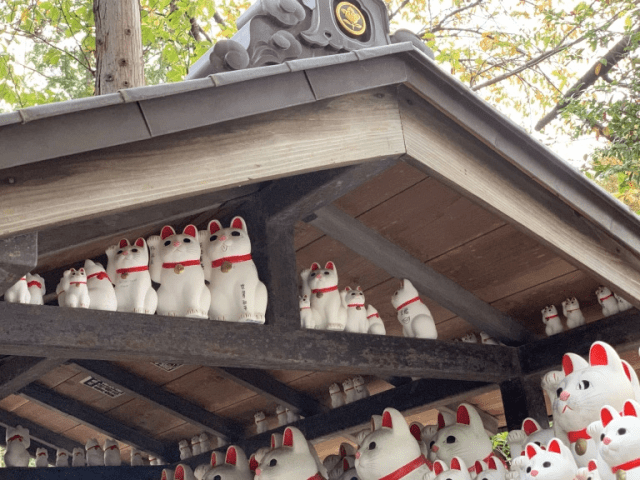
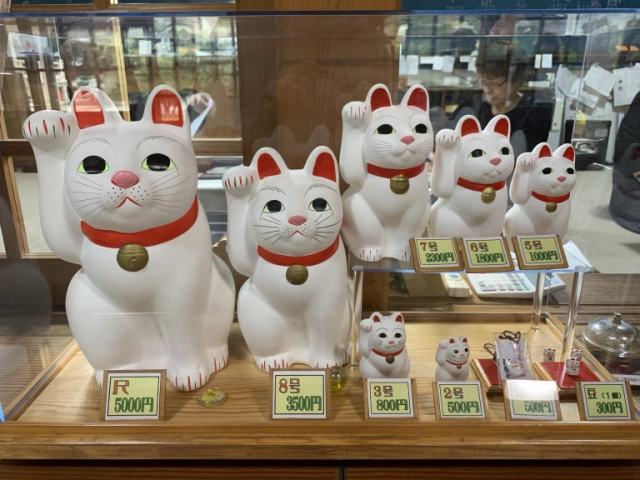
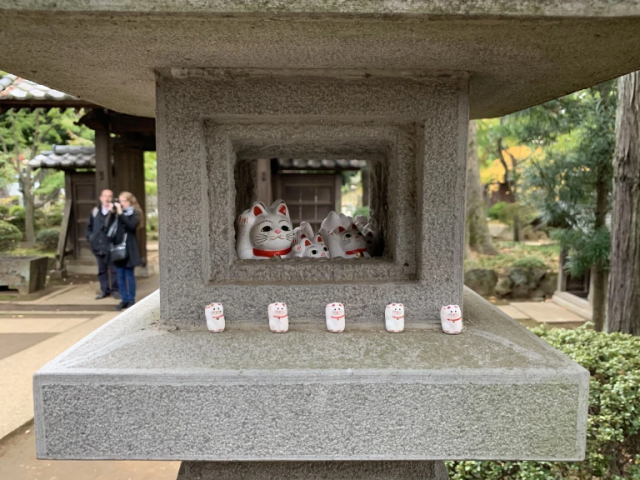
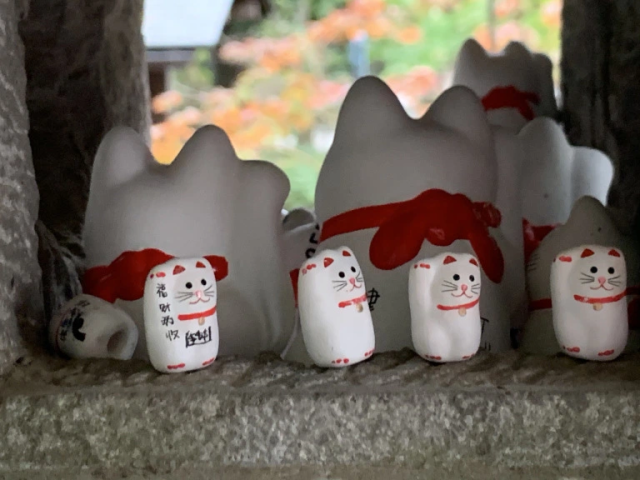
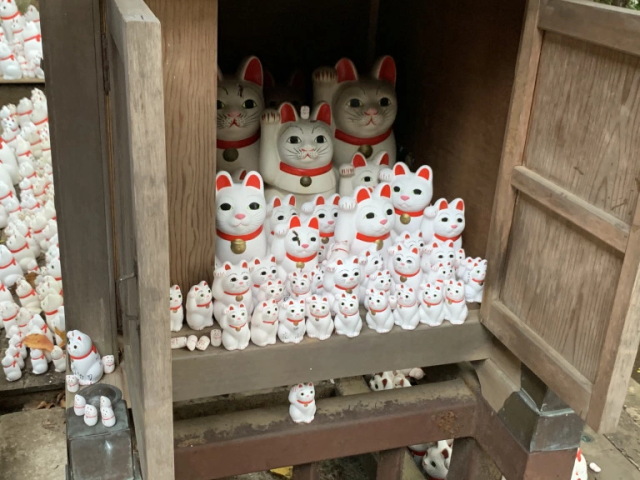
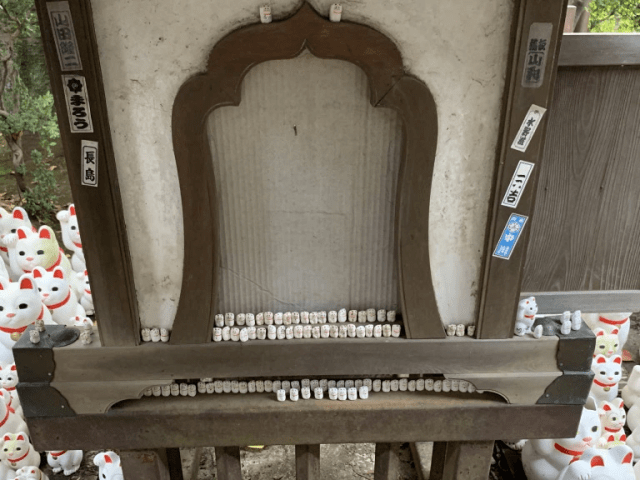
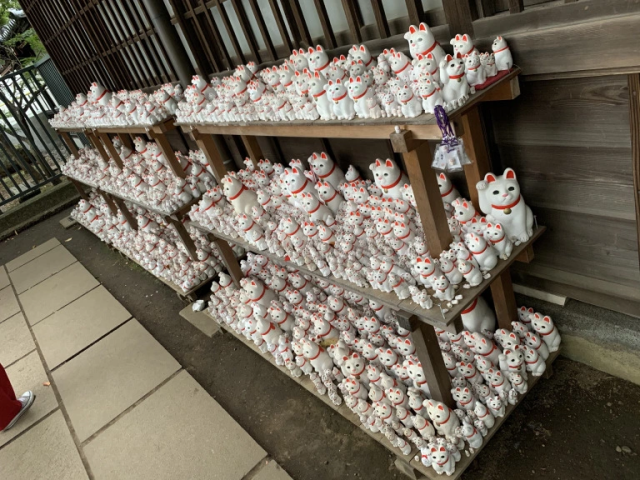
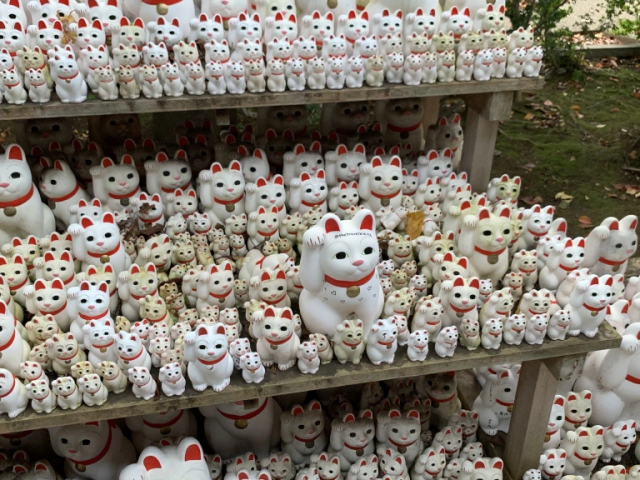
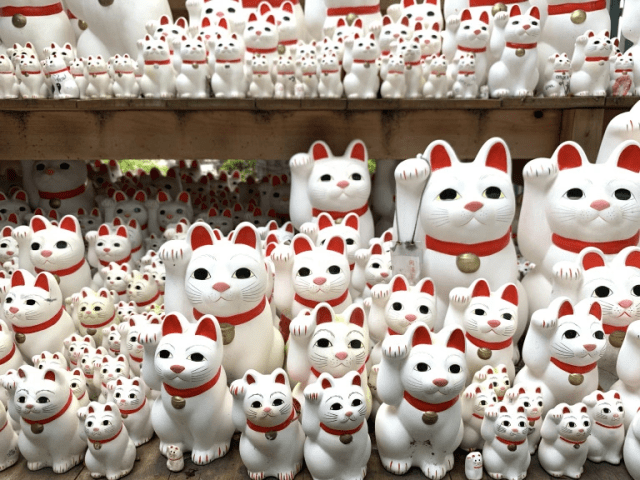
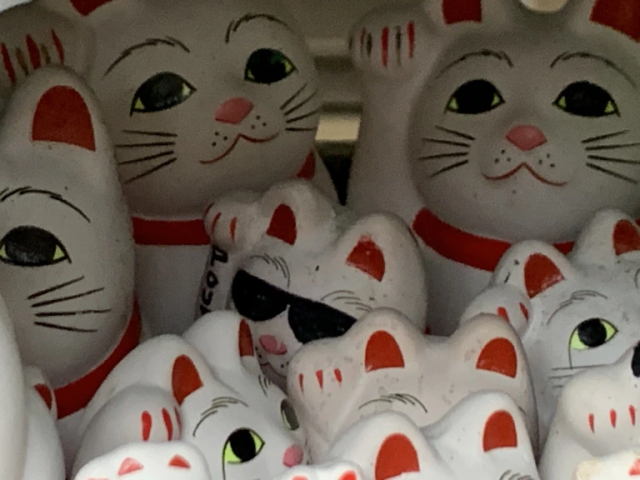
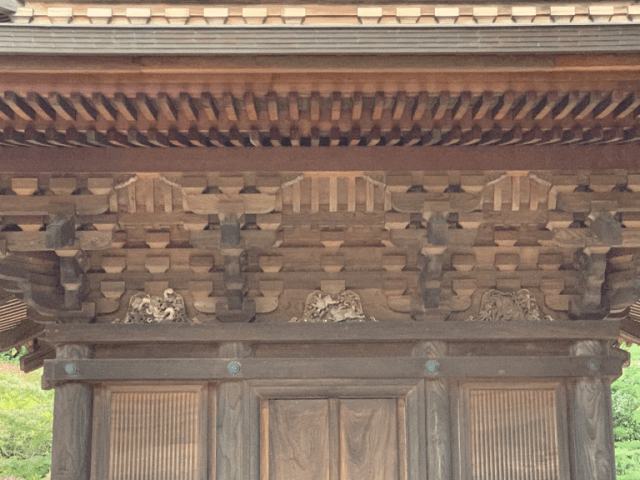
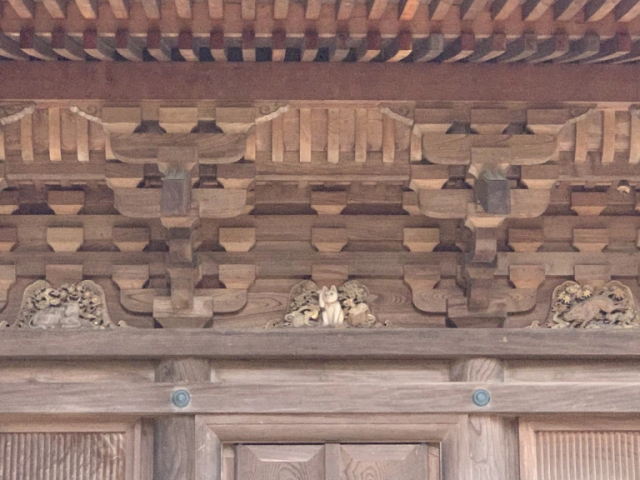
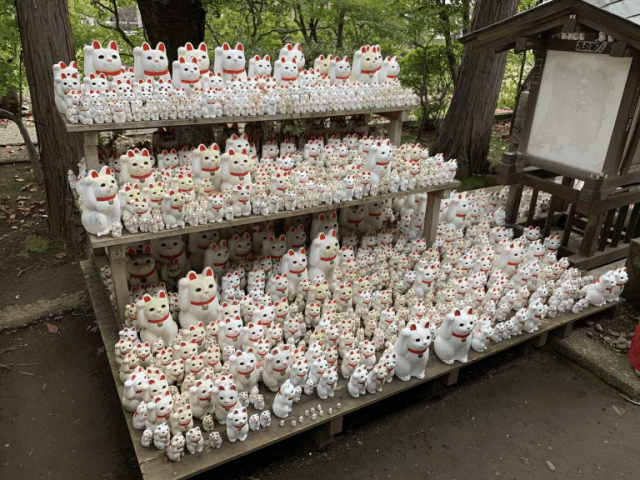
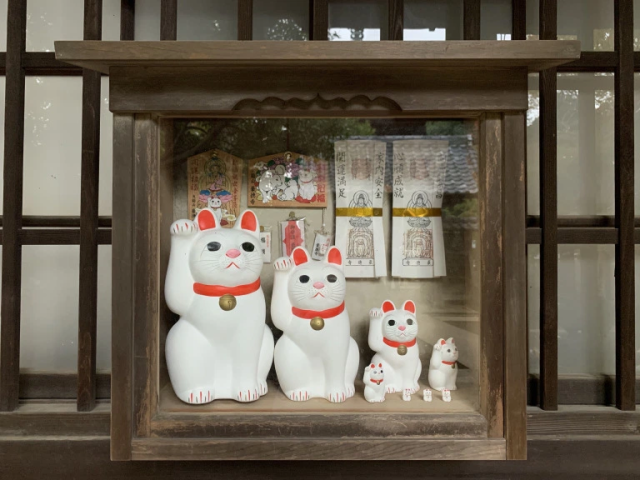
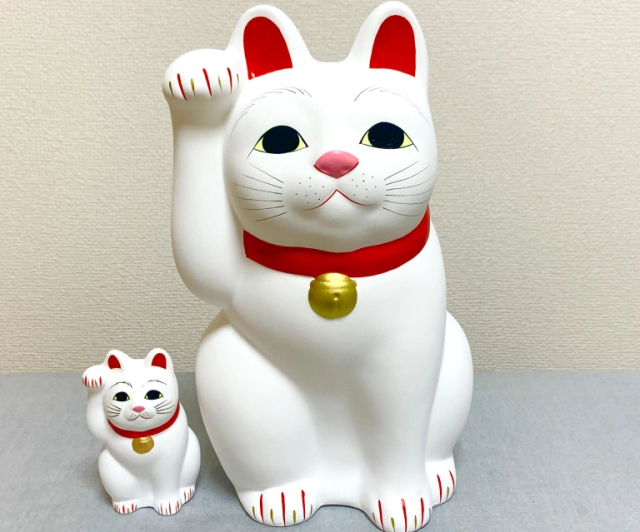
 Tokyo’s beckoning cat temple asks foreign tourists to stop writing on the beckoning cats they buy
Tokyo’s beckoning cat temple asks foreign tourists to stop writing on the beckoning cats they buy Japan’s Lucky Beckoning Cat Panties promise riches, romance, and academic success
Japan’s Lucky Beckoning Cat Panties promise riches, romance, and academic success Amazon Japan’s lowest-rated beckoning cat good luck charm is full of lies, might be cursed【Pics】
Amazon Japan’s lowest-rated beckoning cat good luck charm is full of lies, might be cursed【Pics】 A visit to Japan’s cat beautiful, quirky, and touching cat temple, Unrinji【Photos】
A visit to Japan’s cat beautiful, quirky, and touching cat temple, Unrinji【Photos】 Japanese Lucky Beckoning Cat banknote design is the faux money we wish was real
Japanese Lucky Beckoning Cat banknote design is the faux money we wish was real Starbucks Japan releases first-ever Hinamatsuri Girls’ Day Frappuccino
Starbucks Japan releases first-ever Hinamatsuri Girls’ Day Frappuccino Japanese restaurant chain serves Dragon Ball donuts and Senzu Beans this spring
Japanese restaurant chain serves Dragon Ball donuts and Senzu Beans this spring Tokyo street sweets: The must-snack treats of Nakano’s Refutei
Tokyo street sweets: The must-snack treats of Nakano’s Refutei Japan Extreme Budget Travel! A trip from Tokyo to Izumo for just 30,000 yen [Part 2]
Japan Extreme Budget Travel! A trip from Tokyo to Izumo for just 30,000 yen [Part 2] Miss World Japan: The great-times-20-granddaughter of samurai lord One-Eyed Dragon
Miss World Japan: The great-times-20-granddaughter of samurai lord One-Eyed Dragon Elephant nose ice cream: The treat with a trunk
Elephant nose ice cream: The treat with a trunk Draw like a Studio Ghibli anime artist with exclusive watercolour set approved by Hayao Miyazaki
Draw like a Studio Ghibli anime artist with exclusive watercolour set approved by Hayao Miyazaki Retro game group in Japan donating 100 Super NES systems to families with kids sheltering in place
Retro game group in Japan donating 100 Super NES systems to families with kids sheltering in place Man arrested in rural Japan on charges of leaving obscene DVDs in stores as gifts for “healthy men”
Man arrested in rural Japan on charges of leaving obscene DVDs in stores as gifts for “healthy men” Yakuzen ramen restaurant in Tokyo is very different to a yakuza ramen restaurant
Yakuzen ramen restaurant in Tokyo is very different to a yakuza ramen restaurant The 10 most annoying things foreign tourists do on Japanese trains, according to locals
The 10 most annoying things foreign tourists do on Japanese trains, according to locals Highest Starbucks in Japan set to open this spring in the Tokyo sky
Highest Starbucks in Japan set to open this spring in the Tokyo sky Tokyo Skytree turns pink for the cherry blossom season
Tokyo Skytree turns pink for the cherry blossom season Starbucks Japan releases new sakura goods and drinkware for cherry blossom season 2026
Starbucks Japan releases new sakura goods and drinkware for cherry blossom season 2026 Japan’s new “Cunte” contact lenses aren’t pronounced like you’re probably thinking they are
Japan’s new “Cunte” contact lenses aren’t pronounced like you’re probably thinking they are Shibuya Station’s Hachiko Gate and Yamanote Line stairway locations change next month
Shibuya Station’s Hachiko Gate and Yamanote Line stairway locations change next month Starbucks Japan adds new sakura Frappuccino and cherry blossom drinks to the menu
Starbucks Japan adds new sakura Frappuccino and cherry blossom drinks to the menu Japan just had its first same-month foreign tourist decrease in four years
Japan just had its first same-month foreign tourist decrease in four years Burning through cash just to throw things away tops list of headaches when moving house in Japan
Burning through cash just to throw things away tops list of headaches when moving house in Japan Japan’s newest Shinkansen has no seats…or passengers [Video]
Japan’s newest Shinkansen has no seats…or passengers [Video] Foreigners accounting for over 80 percent of off-course skiers needing rescue in Japan’s Hokkaido
Foreigners accounting for over 80 percent of off-course skiers needing rescue in Japan’s Hokkaido Super-salty pizza sends six kids to the hospital in Japan, linguistics blamed
Super-salty pizza sends six kids to the hospital in Japan, linguistics blamed Starbucks Japan unveils new sakura Frappuccino for cherry blossom season 2026
Starbucks Japan unveils new sakura Frappuccino for cherry blossom season 2026 Foreign tourists in Japan will get free Shinkansen tickets to promote regional tourism
Foreign tourists in Japan will get free Shinkansen tickets to promote regional tourism Take a trip to Japan’s Dododo Land, the most irritating place on Earth
Take a trip to Japan’s Dododo Land, the most irritating place on Earth Naruto and Converse team up for new line of shinobi sneakers[Photos]
Naruto and Converse team up for new line of shinobi sneakers[Photos] Is China’s don’t-go-to-Japan warning affecting the lines at a popular Tokyo gyukatsu restaurant?
Is China’s don’t-go-to-Japan warning affecting the lines at a popular Tokyo gyukatsu restaurant? Survey asks foreign tourists what bothered them in Japan, more than half gave same answer
Survey asks foreign tourists what bothered them in Japan, more than half gave same answer Japan’s human washing machines will go on sale to general public, demos to be held in Tokyo
Japan’s human washing machines will go on sale to general public, demos to be held in Tokyo Starbucks Japan releases new drinkware and goods for Valentine’s Day
Starbucks Japan releases new drinkware and goods for Valentine’s Day We deeply regret going into this tunnel on our walk in the mountains of Japan
We deeply regret going into this tunnel on our walk in the mountains of Japan Studio Ghibli releases Kodama forest spirits from Princess Mononoke to light up your home
Studio Ghibli releases Kodama forest spirits from Princess Mononoke to light up your home Major Japanese hotel chain says reservations via overseas booking sites may not be valid
Major Japanese hotel chain says reservations via overseas booking sites may not be valid Put sesame oil in your coffee? Japanese maker says it’s the best way to start your day【Taste test】
Put sesame oil in your coffee? Japanese maker says it’s the best way to start your day【Taste test】 No more using real katana for tourism activities, Japan’s National Police Agency says
No more using real katana for tourism activities, Japan’s National Police Agency says Nine places where cat lovers in Japan can step up their devotion to worship
Nine places where cat lovers in Japan can step up their devotion to worship Beckoning cat fortunes lure a kitten into their box at cat temple in Japan
Beckoning cat fortunes lure a kitten into their box at cat temple in Japan Starbucks’ Japanese New Year’s/Chinese zodiac drinkware line is full of fun and fortune【Pics】
Starbucks’ Japanese New Year’s/Chinese zodiac drinkware line is full of fun and fortune【Pics】 Cat in Japan finds the perfect shrine to take shelter from the rain at
Cat in Japan finds the perfect shrine to take shelter from the rain at “Cat men” and “catnomics” becoming unprecedented trends in Japan
“Cat men” and “catnomics” becoming unprecedented trends in Japan Kyoto’s uniquely beautiful New Year’s tradition is being carried on by Starbucks Japan【Photos】
Kyoto’s uniquely beautiful New Year’s tradition is being carried on by Starbucks Japan【Photos】 We visited Tokyo’s samurai-period style cat cafe, and here’s why you should too【Photos】
We visited Tokyo’s samurai-period style cat cafe, and here’s why you should too【Photos】 A visit to a cat theater in Tokyo as cat cafe holds movie night【Photos】
A visit to a cat theater in Tokyo as cat cafe holds movie night【Photos】 Dragon reformation and the largest clay Budda in Japan: A visit to Okadera Temple【Photos】
Dragon reformation and the largest clay Budda in Japan: A visit to Okadera Temple【Photos】 A visit to T-CAT, Tokyo’s often forgotten City Air Terminal【Photos】
A visit to T-CAT, Tokyo’s often forgotten City Air Terminal【Photos】 A visit to Japan’s adorable cat bread cafe to try their trendy new cat cream bun【Photos】
A visit to Japan’s adorable cat bread cafe to try their trendy new cat cream bun【Photos】